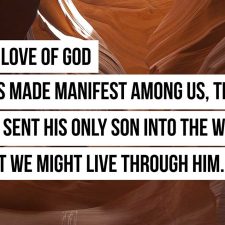“15 So when they had finished breakfast, Jesus said to Simon Peter, ‘Simon, son of John, do you love [agapao] Me more than these?’ He said to Him, ‘Yes, Lord; You know [oida –intuitive] that I love [phileo] You.’ He said to him, ‘Tend My lambs.’ 16 He said to him again a second time, ‘Simon, son of John, do you love [agapao] Me?’ He said to Him, ‘Yes, Lord; You know that I love [phileo] You.’ He said to him, ‘Shepherd My sheep.’ 17 He said to him the third time, ‘Simon, son of John, do you love [phileo] Me?’ Peter was grieved because He said to him the third time, ‘Do you love Me?’ And he said to Him, ‘Lord, You know all things; You know [ginosko – experiential] that I love [phileo] You.’ Jesus said to him, ‘Tend My sheep.’” (John 21:15-17)
So much of Jesus’s efforts during the last days and weeks of His life on earth was trying to prepare the disciples for life without Him physically there. In this exchange with Peter in verses 15-17, Jesus is teaching Peter how he and the disciples will be able to express their love to Jesus after He is ascended by asking questions and giving them the answers.
As the disciples finally recognize, “It is the Lord” (verse 7) on the beach, they respond with affection that has been accumulating toward Jesus over the three-year period they were with Him. They eat breakfast together and now Jesus confronts Peter with three similar, but very different questions that appear to put him on the defensive. To fully understand the passage, we must understand that there are four different Greek words that are translated “love” in English. These are:
- storge represents love within the family between siblings, between parents and children, etc.,
- eros speaks of love between a man and woman in an intimate relationship,
- phileo is usually related to love between friends, and
- agapao is love between God and man and has an unconditional characteristic.
In this exchange, Jesus and Peter use phileo and agapao which obviously can change the meaning.
He who has found his life will lose it
Jesus’s first question to Peter is: Do you love me with God’s love more than the physical things in life that you have attached yourself to, including friends, family, money, position, etc.? God is a jealous God (Exodus 34:14) and He desires our primary devotion. In Matthew 10:37-39, Jesus taught this principle when He said, “He who loves father or mother more than Me is not worthy of Me; and he who loves son or daughter more than Me is not worthy of Me. “And he who does not take his cross and follow after Me is not worthy of Me. “He who has found his life will lose it, and he who has lost his life for My sake will find it”. Notice that Jesus asks about loving with God’s love, while Peter answers with phileo, speaking of the love he had for Jesus as a friend. Jesus is trying to tell Peter that his friendship love is not going to be enough. In either case, Jesus’s answer is, “Tend my lambs” meaning your love for me should be expressed in the way you take care of the sheep (believers) of God.
The second question is focused completely on the quality of Peter’s love for Jesus and is not a comparative. Instead, He asks Peter for the kind of love that is different than Peter had ever experienced before; speaking of total devotion to Jesus. Of course, it needed to be more than friendship. I am sure Peter remembered what happened when Jesus was taken away for trial and Peter denied knowing Him three times (Luke 22). The fact is that this kind of love does not reside with man, but is only possible when we consider the quality of God’s love for us (1John 4:19). A successful believer is one who learns to live the supernatural life that begins with God’s love! Jesus’ response was basically the same as the first: “Shepherd My sheep”.
Tend my sheep
In the third question, Jesus uses the Greek word phileo instead of agapao. He is asking Peter if the relationship Peter has with Him has changed since His resurrection. Peter is now grieving at the question because he thinks that Jesus should know (Greek word ginosko, meaning knowledge by experience) that Peter is a devoted friend. Again, the answer Jesus gives is “Tend My sheep”. Whatever type of love we have for Jesus, the answer is always the same, take care of the sheep. This reminds us of Jesus’s teaching in Matthew 25:34-40 which concludes with the statement, “Truly I say to you, to the extent that you did it to one of these brothers of Mine, even the least of them, you did it to Me”. In the passage, Jesus speaks of feeding the hungry and thirsty, visiting the stranger, clothing the naked, and visiting the sick and imprisoned as some ways we show our personal love of Jesus. In Galatians 5:6, faith works by agapao love.
No longer living for me
“14 For the love [agapao] of Christ controls us, having concluded this, that one died for all, therefore all died; 15 and He died for all, so that they who live might no longer live for themselves, but for Him who died and rose again on their behalf. 16 Therefore from now on we recognize no one according to the flesh; even though we have known Christ according to the flesh, yet now we know Him in this way no longer”. (2 Corinthians 5:14-16)
The apostle Paul teaches this principle of agapao love in 2 Corinthians 5:14. This love is meant to “control” us, literally to be closely held by love. The basis of this happening in a believer’s personal life is that he finally comes to the conclusion that Jesus’s death means that he died too. It means that because Jesus was willing to die for each believer personally and therefore a sufficient reality, it means each believer need no longer live for personal interest, but are now controlled by agapao love. In 1 Corinthians 6:19-20, “…and that you are not your own? For you have been bought with a price…”
Then in verse 16, he speaks of recognizing or knowing no one according to the flesh, not even Jesus. Our relationship with others, spiritually speaking, should no longer be according to any type of love that is natural, of the flesh, because that kind of love is still conditional. Only God’s love is unconditional and therefore the Christian requires this kind of love. This means there needs to be a decision to die to one’s own personal interests and only then can he find agapao love. This is the very same message Jesus was trying to teach Peter and the disciples on the beach. This agapao love is also the basis of the relationship between believers within the body of Christ.
Forgiveness
The most obvious evidence a believer has of God’s love is knowing he is forgiven without doing anything other than believe (Romans 5:8). In Luke 7:40-50, the woman who was of questionable character (a sinner in verse 37) is moved to tears as she wipes her tears and very expensive perfume on Jesus’s feet. She is demonstrating love toward Jesus because her faith believes in who Jesus is and that she is forgiven. And the expression of that forgiven condition is loving much. Jesus commends her as an example of one who recognizes the degree of forgiveness and is now divinely enabled to love Jesus with agapao love. The opposite condition is also true, as Jesus says, “but he who is forgiven little, loves little” (verse 47). The love cycle begins with God’s love toward us (“We [agapao] love because He first [agapao] loved us” (1 John 4:19).
When we talk about forgiveness, we must also talk about the debt that has been forgiven. Paul says that the only debt we should have in Romans 13:8 is to owe agapao love to others. Once we come to grips with the fact that we have no debts because of Jesus, we are ready to take on His debt, which is the agapao love of others. In fact, he says that this agapao love of others fulfills the law and relates this love to the fulfillment of a number of the Ten Commandments. When Jesus was asked by a scribe “which is the great commandment in the law?” His response in Matthew 22:35-40 was that you shall love God and love your neighbor. In Verse 40, “On these two commandments depend the whole Law and the Prophets”. The essence of our faith in Jesus is the expression of agapao love in loving God and loving others.
Security in God’s love
“10 I am my beloved’s, and his desire is for me. 11 Come, my beloved, let us go out into the country, let us spend the night in the villages. 12 Let us rise early and go to the vineyards; let us see whether the vine has budded and its blossoms have opened, and whether the pomegranates have bloomed. There I will give you my love. 13 The mandrakes have given forth fragrance; and over our doors are all choice fruits, both new and old, which I have saved up for you, my beloved.” (Song 7:10-13)
Falling in love with God is not something that takes place immediately, but like any relationship it is a process. The Song of Solomon, written by Solomon, is the account of a romance between King Solomon and a Shulammite woman. It is also a picture of the love relationship between the bride (the church) and the bridegroom (Jesus Christ). In looking at this process of love between the two, we can glean from three particular verses what this process looks like from the bride’s (Christian’s) perspective. In the first (Song 2:16), the bride says, “My beloved is mine, and I am his”. The idea is expressed that He belongs to me first, then I belong to Him. In Song 6:3, “I am my beloved’s and my beloved is mine”. Notice that she now recognizes that she belongs to Him first, then He belongs to her. We go through the same process in the growth of our relationship with Jesus, becoming more and more confident in His love. In the context of Song of Solomon, Song 2:16 takes place before the wedding and Song 6:3 afterwards.
The third verse above completes the process, “I am my beloved’s, and his desire is for me”. The woman is so convinced about the bridegroom’s love for her that she does not need to express it. This is the fulfillment of God’s love for us and how we become more and more secure in that love. Our passage above in Song 7 continues with the bride and bridegroom going out into the country, in the villages, going to the vineyards, and looking at the fruit of the vine, the pomegranate, and the mandrake. When the believer is fully convinced of Jesus’s personal love for him, he is excited to participate in the work of God in the world to love others, thus producing fruit of all kinds. In verse 12, “there I will give you my love”. Loving others becomes an integral part of our relationship to Jesus.
A way of life
We see the ultimate picture of agapao love in Romans 12:9-13 with the principles of being diligent, devoted to one another, preference others in honor, devoted to prayer, contributing to the needs of others, and practicing hospitality. This type of love produces a way of life within the believer and is the fulfillment of God’s agapao love in us (1John 4:12). The transforming life of the Holy Spirit produces an amazing change in the believer’s heart to live the supernatural life of agapao love!













